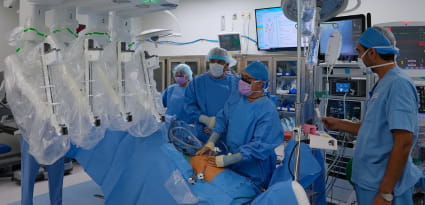
Cutting-edge endoscopic and diagnostic technology help JHAH’s gastroenterology unit to dramatically reduce patient wait times
Average wait for routine gastrointestinal services reduced from eight weeks to one after new technology and advanced minimally invasive techniques introduced.
Gastroenterology patients at Johns Hopkins Aramco Healthcare (JHAH) are undergoing routine endoscopy within a week of diagnosis, and minimally invasive surgery within two weeks, after a technology transformation project dramatically reduced wait times.
The project — which involves the introduction of advanced diagnostic and therapeutic endoscopy, new diagnostic techniques, and several new services — has also led to shorter inpatient stays and a huge reduction in referrals to external providers.
The transformation project, which covers both outpatient and inpatient gastroenterology services, aims to boost the capacity, efficiency, and safety of JHAH’s gastroenterology services. The project has exceeded international quality metrics as well as JHAH’s own targets.
“These advancements underscore our dedication to providing cutting-edge, patient-centered care,” Dr. Nassir Al Hayaf, Chief of Specialty Medicine at JHAH, said.
A key driver of the success of the gastroenterology unit transformation project is the introduction of state-of-the-art technology that allows advanced diagnostic and therapeutic procedures to be undertaken in-house. These technologies include:
- SpyGlass™ cholangioscopy. A groundbreaking procedure for diagnosing and treating bile duct disorders using a tiny scope.
- Single balloon enteroscopy. A minimally-invasive technique for in-depth examination of the small intestine.
- Endoscopic High-quality imaging and precise tissue sampling now enable in-house diagnosis of malignancies, replacing the need for external referrals.
- Esophageal pH and manometry. These are critical procedures for accurately diagnosing esophageal disorders.
The new technology has helped JHAH clinicians to increase the capacity for diagnostic and therapeutic endoscopic procedures performed at the hospital and improve quality across the board. Advanced endoscopic surgical procedures help patients to recover faster, and with less pain, than traditional open surgery.
In 2024, JHAH referred 35% fewer gastroenterology cases to external providers compared with 2023, thereby reducing delays and complexity for patients, and improving their experience.
A young mother who underwent evaluation and treatment for a liver transplant at JHAH said: “Being close to my family made all the difference during my journey.”
JHAH’s gastroenterology unit has also expanded its capabilities by hiring specialist clinicians and establishing new clinics. For example, JHAH now has a board-certified hepatologist who specializes in liver transplants, and a dedicated hepatology clinic for patients with complex liver diseases and transplant needs. This has enhanced the service offered to all patients, and especially patients who have had or require liver transplants.
The gastroenterology unit is in the process of further enhancing its diagnostic capabilities. It will soon offer pH monitoring with the minimally invasive Bravo capsule, a device that attaches to the esophageal lining and wirelessly transmits pH data for up to 96 hours. It has also installed the latest cutting edge FibroScan machine, which assesses fibrosis and cirrhosis using non-invasive ultrasound technology, preventing the need for a liver biopsy in many cases.
Learn more about gastroenterology services at JHAH
